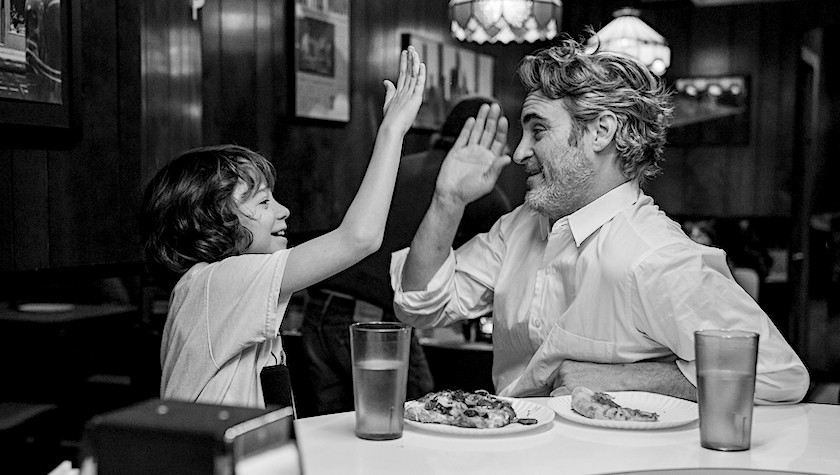
C’mon C’mon is just the fourth feature in 17 years for acclaimed writer-director Mike Mills. Following Thumbsucker (2005), Beginners (2010), and 20th Century Women (2016), the Joaquin Phoenix-led C’mon C’mon marks yet another insightful and very human picture for the filmmaker, here exploring a range of themes, from the long-lasting effects of familial dynamics, to the importance of intergenerational communication, to mental illness.
More fantastic work from Phoenix, who provides a seemingly effortless performance as radio journalist Johnny. After his estranged sister, Viv (Gabby Hoffman), is forced to leave town to take care of her bi-polar-suffering husband (Scoot McNairy), Johnny finds himself tasked with taking care of his nephew, an energetic, challenging, patience-testing nine-year-old, Jesse (Woody Norman). When work beckons, Johnny gets Viv’s permission to take Jesse with him to spend a period in New York, unaware of the simultaneously fulfilling and taxing time that lies ahead for them both.
C’mon C’mon‘s beautiful thematic backdrop is provided with Johnny’s current project: going around the country and interviewing young people about their concerns and dreams, their lives and futures, and the state of the world. It’s an almost documentary aspect of the film, as Phoenix and co. conduct real interviews with everyday teens and children that fit perfectly with the film in not only a narrative sense – seeing as that’s his job – but as sweet and sometimes heartbreaking discussion points. Mills wants to not only look at the relationships between parents and children, but between generations overall. We can learn from the young, but will we truly pay attention to them in order to do so?
Mills’ screenplay is a layered work, delivered modestly. One can take the small-scale happenings on screen for what they are: conversations between adults and children that showcase some interesting points about life, and the annoyances that can occur when attempting to take care of a demanding child. But Mills’ script benefits greatly from immersion and search for understanding; it can also be about the human condition – and you may find a few elements that strike a chord personally, looking back at your parents during your own childhood, or perhaps with your experience as a parent/guardian.
Mills and cinematographer Robbie Ryan (The Favourite, Marriage Story) tell the story using gorgeous black and white cinematography. The picturesque landscape/cityscape shots throughout nicely contrast the intimacy of the character moments – working as visual reminders of the collective experience that is life. The older we get, the more differences we find, but hey, we’re still on this rock together.
As mentioned, Phoenix delivers another strong performance here, wonderfully navigating the understandable frustrations that arise with Jesse, while convincing of his care for the child and his desire to do his very best. Holding his own alongside Phoenix is young Woody Norman, tackling and delivering a complex character with Jesse, filled with interesting quirks, surprising levels of maturity, and irritating tendencies. Ultimately (and it’s something that both Johnny and the audience need to remind themselves of now and again), Jesse is still a child – one in need of affection, care and understanding, although, perhaps not in the usual ways one would imagine. Hoffman is also extremely natural and sympathetic as Viv, while McNairy provides small but heartbreaking moments as Jesse’s bi-polar father, Paul.
C’mon C’mon doesn’t aim to heavily pull on those heartstrings, but Mills’ measured pacing and carefully crafted screenplay may very well provide a lump in the throat by the time the children’s interviews play out during the end credits. Among other things, C’mon C’mon is a sweet reminder to remember what it was like to be a child – the hopes, the dreams, the frustrations, the way we looked at the world and at adults – and to ensure the next generation doesn’t forget as they age either.











